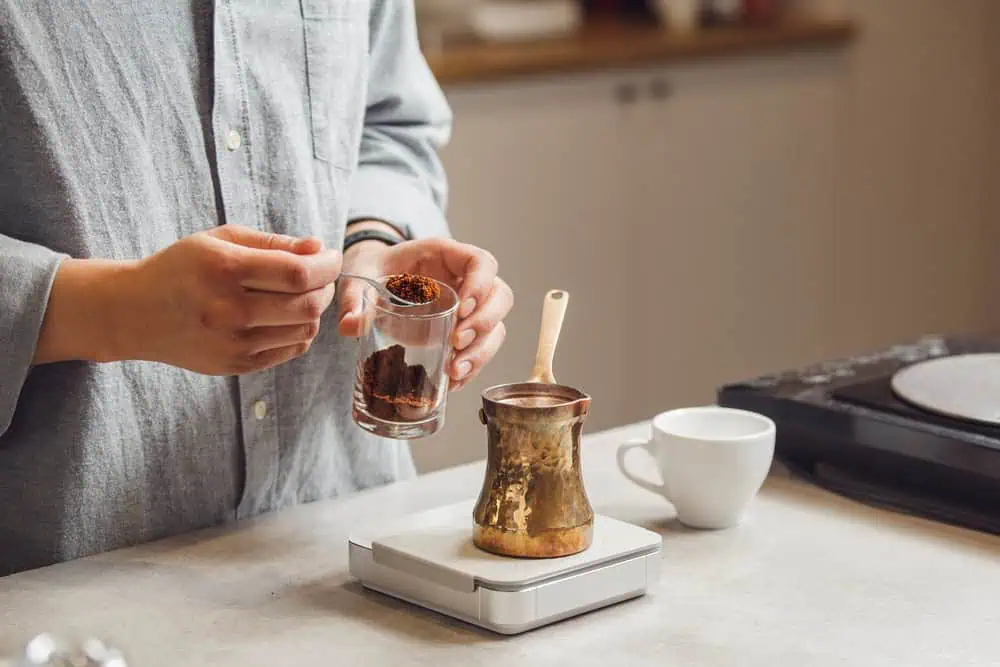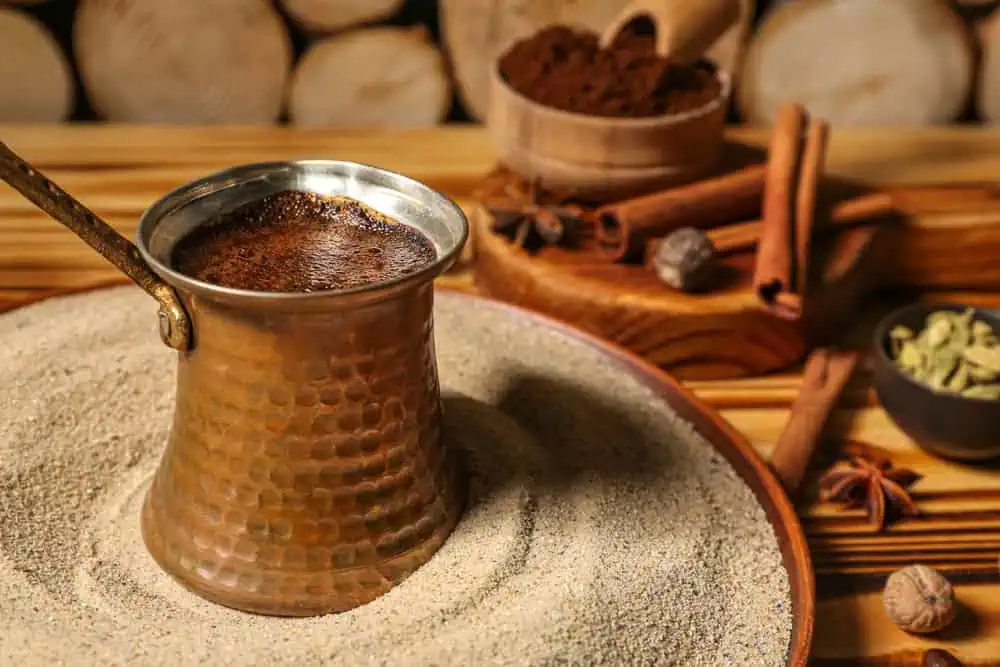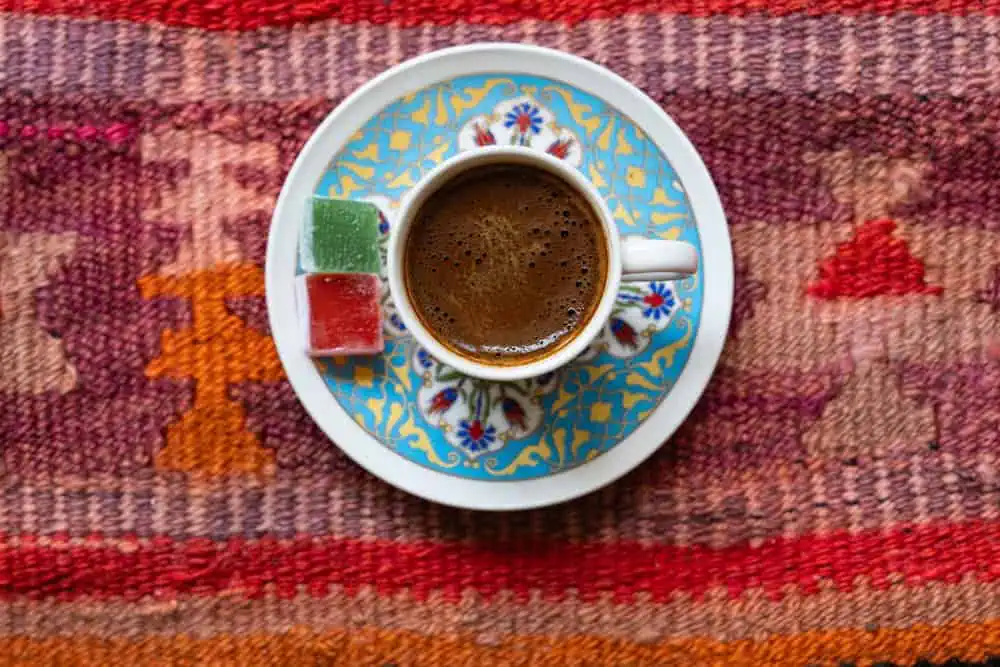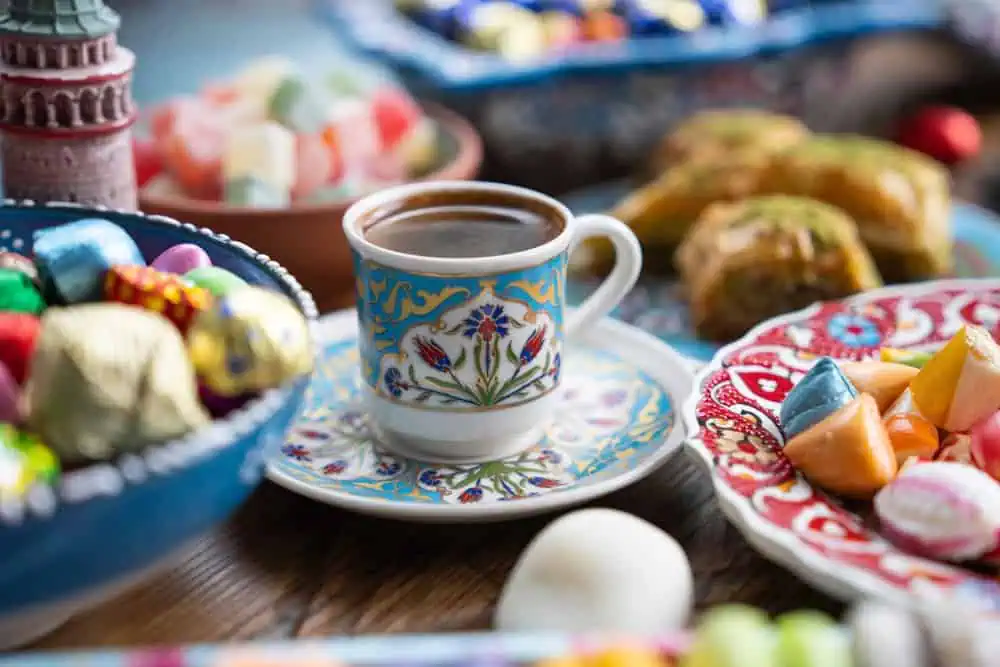Few beverages in the world carry as much cultural significance as Turkish coffee. Known for its rich flavor, unique preparation method, and role in fostering connections, this centuries-old tradition goes far beyond being just a drink. Turkish coffee is deeply embedded in Turkey’s heritage, celebrated as a symbol of hospitality, respect, and community.
Turkish Coffee Culture is not merely about enjoying a cup of coffee; it’s about experiencing a ritual steeped in history, from the Ottoman Empire to modern-day Turkey. This beloved tradition has even earned recognition as a UNESCO Intangible Cultural Heritage, highlighting its global importance.
In this post, we’ll explore the fascinating history of Turkish Coffee Culture, uncover the secrets behind its preparation, and dive into the rich rituals and traditions that make it so much more than just a drink. By the end, you’ll see why Turkish coffee holds a special place in the hearts of those who savor it.
The History of Turkish Coffee Culture
The story of Turkish coffee begins in the heart of the Ottoman Empire, where this rich and aromatic beverage first gained prominence in the 16th century. Introduced from the Arabian Peninsula, coffee quickly became a cornerstone of social and cultural life in Istanbul and beyond. The sultans of the Ottoman Empire embraced coffee, establishing coffeehouses as centers of conversation, art, and politics.
The history of Turkish Coffee Culture dates back centuries, reflecting its profound influence on the region. These coffeehouses, known as “kahvehane,” became gathering places where people exchanged ideas, discussed news, and formed a sense of community. Over time, Turkish coffee spread across Europe and Asia, carried by traders, diplomats, and travelers who were captivated by its unique taste and preparation.
In 2013, Turkish coffee was recognized as a UNESCO Intangible Cultural Heritage, cementing its place as a symbol of Turkey’s rich traditions. This global acknowledgment highlights not only the beverage itself but also the rituals, techniques, and social practices that define Turkish Coffee Culture.
From its imperial roots to its enduring presence in modern Turkish life, the history of Turkish coffee is a testament to its lasting significance and universal appeal.
How Turkish Coffee Is Made
Making Turkish coffee is an essential part of Turkish Coffee Culture, combining artistry, tradition, and precision to create a truly unique beverage. The process begins with a special pot called a cezve, a small, long-handled pot traditionally made of copper or brass. This vessel is key to achieving the rich, frothy coffee that defines Turkish coffee.
Key Ingredients
The preparation requires just a few simple ingredients:
- Finely ground coffee: The grind is much finer than for other brewing methods, resembling powdered sugar.
- Water: Measured carefully to ensure the perfect balance.
- Optional sugar: Added during brewing, not after, to customize the sweetness level.
Traditional Preparation Method
- Start by adding cold water to the cezve, measuring one cup for each serving.
- Add one heaping teaspoon of finely ground coffee per cup, along with sugar if desired (mild, medium, or sweet).
- Mix the ingredients gently, then place the cezve on low heat.
- Allow the coffee to heat slowly, watching for the signature frothy layer to form on top. Do not stir after the initial mixing.
- As the coffee begins to foam and rise, remove the cezve from heat just before it boils.
- Pour the coffee into small cups, ensuring the froth is distributed evenly.
Unique Aspects of Turkish Coffee
Unlike many brewing methods, Turkish coffee is unfiltered, meaning the coffee grounds settle at the bottom of the cup. This gives it a bold, concentrated flavor and a velvety texture. The frothy layer on top, known as “köpük,” is a hallmark of well-made Turkish coffee and is considered a sign of skill in preparation.
The ritual of preparing and serving Turkish coffee is as significant as drinking it, reflecting the cultural values of care, hospitality, and attention to detail. This meticulous process has remained unchanged for centuries, a testament to the enduring charm of Turkish Coffee Culture.
The Rituals and Traditions Surrounding Turkish Coffee
Rituals in Turkish Coffee Culture reflect deep-rooted traditions, making it more than just a beverage—it’s a cornerstone of social and cultural life. The preparation, serving, and enjoyment of Turkish coffee are steeped in meaningful customs that have been passed down through generations.
Hospitality and Social Interaction
In Turkish households, serving coffee is an essential gesture of hospitality. Offering a cup of Turkish coffee to guests signifies respect and warmth. It’s customary to present the coffee on a tray with a glass of water and sometimes a sweet treat like Turkish delight. This act fosters conversation and connection, reflecting the communal spirit of Turkish Coffee Culture.
Marriage Customs
One of the most famous traditions involving Turkish coffee is its role in marriage proposals. When a suitor visits the bride-to-be’s home with their family, the bride prepares and serves Turkish coffee. For a playful twist, the bride might add salt instead of sugar to the groom’s cup to gauge his reaction—an informal “test” of his patience and sense of humor. This ritual is a cherished part of Turkish engagement customs, symbolizing unity and partnership.
Fortune-Telling with Coffee Grounds
Another intriguing tradition is coffee cup fortune-telling, or “fal.” After drinking the coffee, the cup is inverted onto its saucer, allowing the grounds to settle. A fortune-teller or a friend then interprets the patterns left behind, offering insights into the drinker’s future. While not taken too seriously, this practice is a beloved social activity that adds an element of mystery and fun to coffee gatherings.
Preserving Cultural Identity
These rituals are not merely about coffee; they serve as a way to honor Turkish heritage and strengthen bonds within the community. Whether through hosting guests, celebrating engagements, or reading fortunes, Turkish Coffee Culture remains a vibrant expression of tradition and identity.
The Symbolism of Turkish Coffee Culture
The symbolism of Turkish Coffee Culture goes beyond the drink itself, serving as a profound expression of hospitality, friendship, and respect. In Turkey, offering a cup of Turkish coffee is a deeply meaningful gesture that carries significant cultural weight. It is not just about sharing a beverage, but about creating a connection, showing honor, and inviting conversation.
Hospitality and Respect
One of the most important values associated with Turkish coffee is hospitality. When you visit a Turkish home, it is customary for your host to offer you coffee, sometimes before even offering a seat. This act of kindness is not merely about satisfying thirst—it’s a sign of respect and warmth. In fact, the phrase “A guest is a gift from God” is a common saying in Turkey, underscoring the importance of making guests feel welcome and appreciated.
Friendship and Community
Turkish coffee also plays a significant role in nurturing friendships and building community. Sharing a cup of coffee provides an opportunity to pause, reflect, and engage in meaningful conversations. It’s common for friends and family to gather over Turkish coffee, exchanging stories, advice, and laughter. This ritual helps strengthen relationships and maintain close-knit social bonds.
Fostering Meaningful Conversations
The slow and deliberate process of brewing and sipping Turkish coffee encourages deep, reflective conversations. In a society where face-to-face interaction is highly valued, the act of sitting down for coffee offers a chance to truly listen and connect. Whether it’s discussing life’s challenges or celebrating moments of joy, Turkish coffee serves as the backdrop for some of the most meaningful exchanges.
A Ritual of Connection
More than just a drink, Turkish coffee symbolizes a bridge between people, creating spaces for hospitality, friendship, and understanding. Its enduring role in Turkish society is a testament to its cultural significance—Turkish coffee is a timeless tradition that fosters unity and meaningful connections.
Where to Experience Authentic Turkish Coffee Culture
To truly explore authentic Turkish Coffee Culture, Istanbul is the perfect place to start. The city’s historic cafes offer a taste of traditional Turkish coffee, while modern coffeehouses provide a creative twist on this cultural ritual.
Famous Coffeehouses in Istanbul
- Çınaraltı Kahvesi: A scenic cafe by the Bosphorus, offering a perfect blend of coffee and views.
- Mandabatmaz: Known for its thick, rich coffee, this hidden gem in Beyoğlu captures the essence of Turkish coffee.
- Karaköy Güllüoğlu: Famous for its baklava and traditional coffee, offering an authentic experience.
Modern Coffeehouse Adaptations
Many contemporary cafes in Istanbul have embraced Turkish coffee traditions while adding modern touches, appealing to younger crowds and international visitors.
Turkish Coffee-Making Workshops
For a deeper dive into Turkish Coffee Culture, participate in a workshop where you can learn the art of brewing, discover its history, and master the traditional techniques.
Istanbul’s cafes, both traditional and modern, offer the perfect setting to experience the rich heritage of Turkish coffee.
Health Benefits of Turkish Coffee
Health benefits are an often-overlooked aspect of Turkish Coffee Culture, yet this rich, aromatic drink offers more than just a caffeine boost. Turkish coffee is packed with antioxidants and compounds that contribute to overall well-being.
Antioxidants and Nutrients
Turkish coffee is known for its high antioxidant content, which helps combat free radicals and reduce inflammation. The coffee grounds, being unfiltered, contain more antioxidants than other brewing methods, providing a natural boost to the immune system and promoting heart health.
Energizing Properties
The energizing effects of Turkish coffee are well-known. Due to its fine grind and unfiltered nature, it delivers a more concentrated form of caffeine, offering a longer-lasting energy boost. This makes it a perfect drink to start the day or recharge in the afternoon.
Cultural Association with Well-Being
In Turkish culture, coffee is often enjoyed as a way to unwind and connect with others. It’s not just a beverage, but a ritual that promotes mental clarity and relaxation. Sharing a cup of Turkish coffee is seen as a way to nurture relationships and foster well-being.
Turkish coffee’s health benefits go beyond its energizing effects, making it an essential part of Turkish Coffee Culture.
How to Incorporate Turkish Coffee Culture Into Your Life
You don’t have to be in Turkey to experience the magic of Turkish Coffee Culture. With a few simple steps, you can bring this rich tradition into your own home.
Make Turkish Coffee at Home
To get started, all you need is a cezve (a small pot), finely ground Turkish coffee, water, and optional sugar. Heat the mixture slowly, allowing it to froth before removing it from the heat. Repeat the process a couple of times for that perfect frothy texture. You can embrace Turkish Coffee Culture by learning its preparation techniques, which are simple yet ceremonial, creating an immersive experience.
Pair with Traditional Turkish Delights
Turkish coffee is often paired with lokum (Turkish delight), a sweet treat that complements the coffee’s rich, bold flavor. Whether you’re enjoying a quiet moment alone or sharing with friends, pairing these two delights will transport you to the heart of Turkish culture.
Incorporating Turkish coffee into your daily routine allows you to enjoy a time-honored tradition while embracing the cultural richness it represents.
Conclusion
Turkish coffee is far more than just a drink—it’s a rich cultural tradition that spans centuries. From its historical roots in the Ottoman Empire to its designation as UNESCO Intangible Cultural Heritage, Turkish Coffee Culture reflects the heart and soul of Turkey. It’s a symbol of hospitality, friendship, and connection, woven deeply into the fabric of daily life.
As we’ve seen, Turkish coffee is a ritual that goes beyond its energizing properties. It’s a celebration of conversation, tradition, and well-being. Turkish Coffee Culture is a way of life, a reflection of respect and shared moments with others.
Whether you’re traveling to Turkey or brewing a cup at home, we encourage you to experience this iconic drink firsthand. Try making Turkish coffee yourself, or seek out authentic coffeehouses to fully immerse yourself in the experience.








